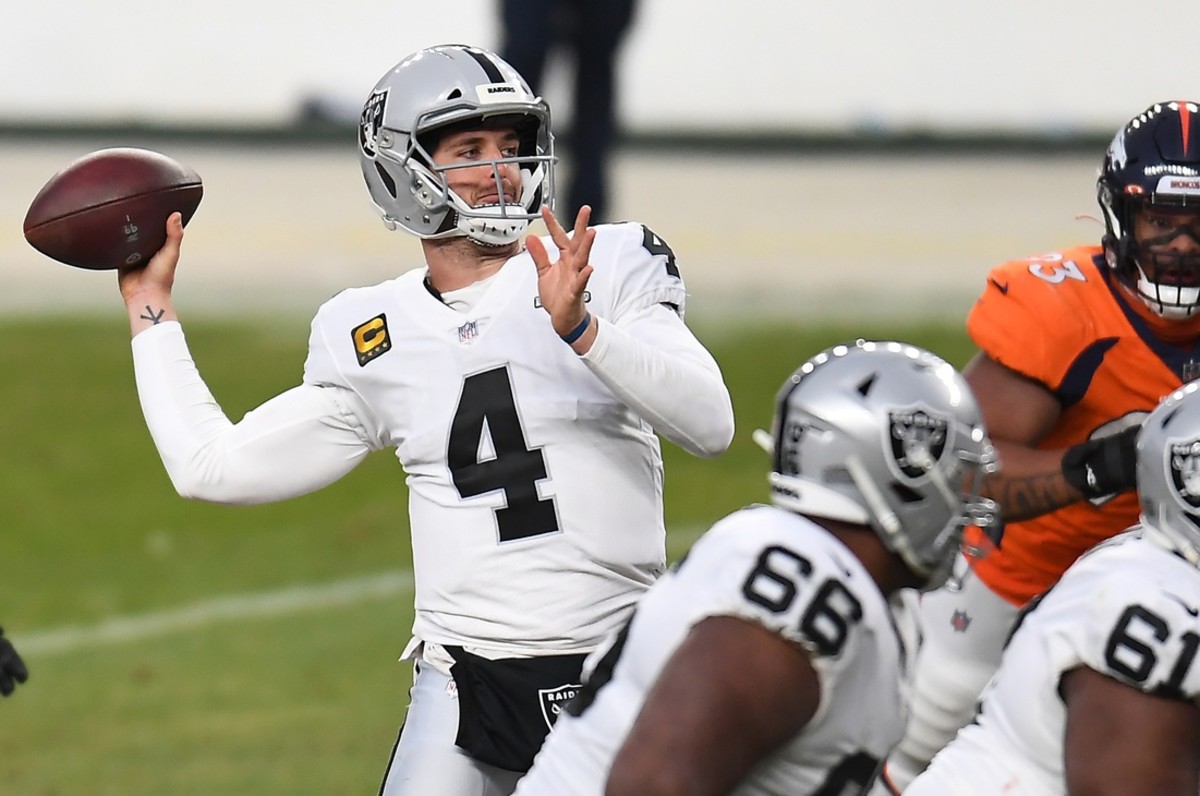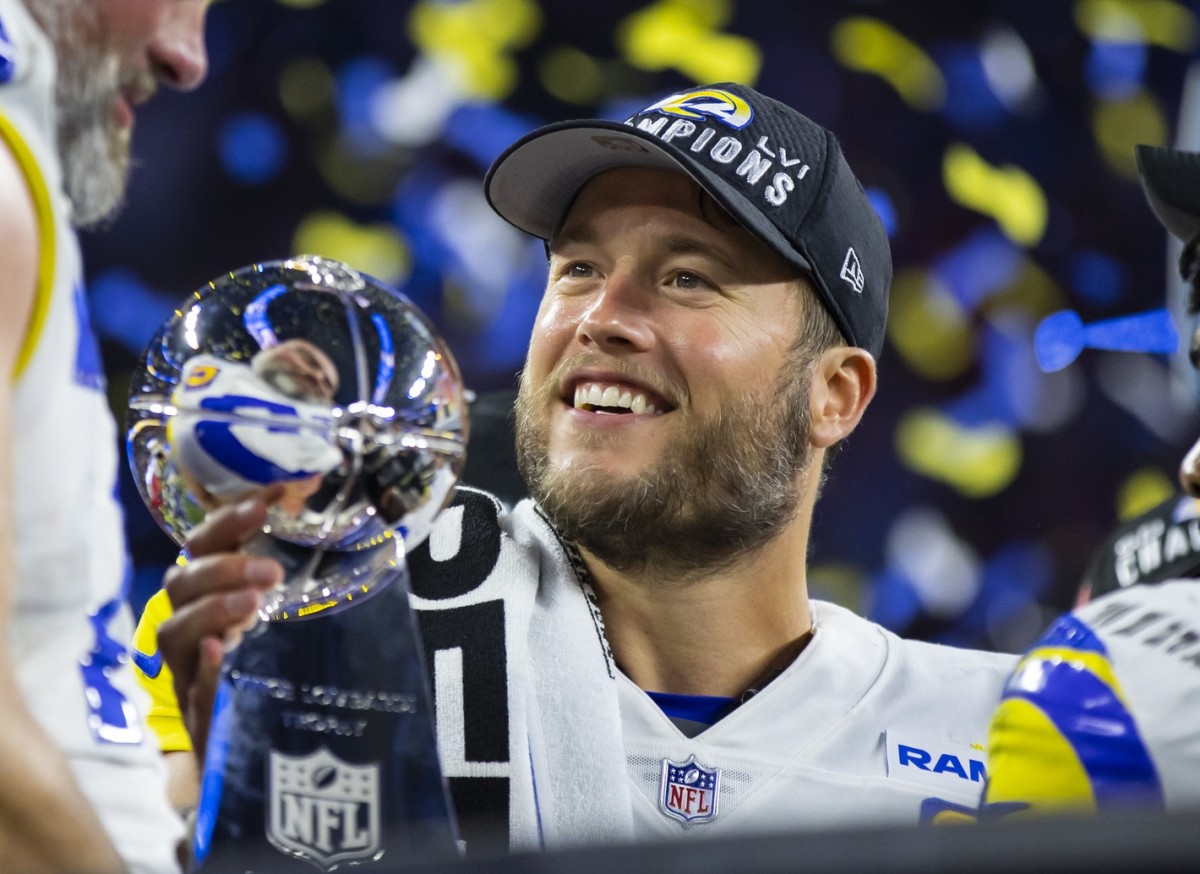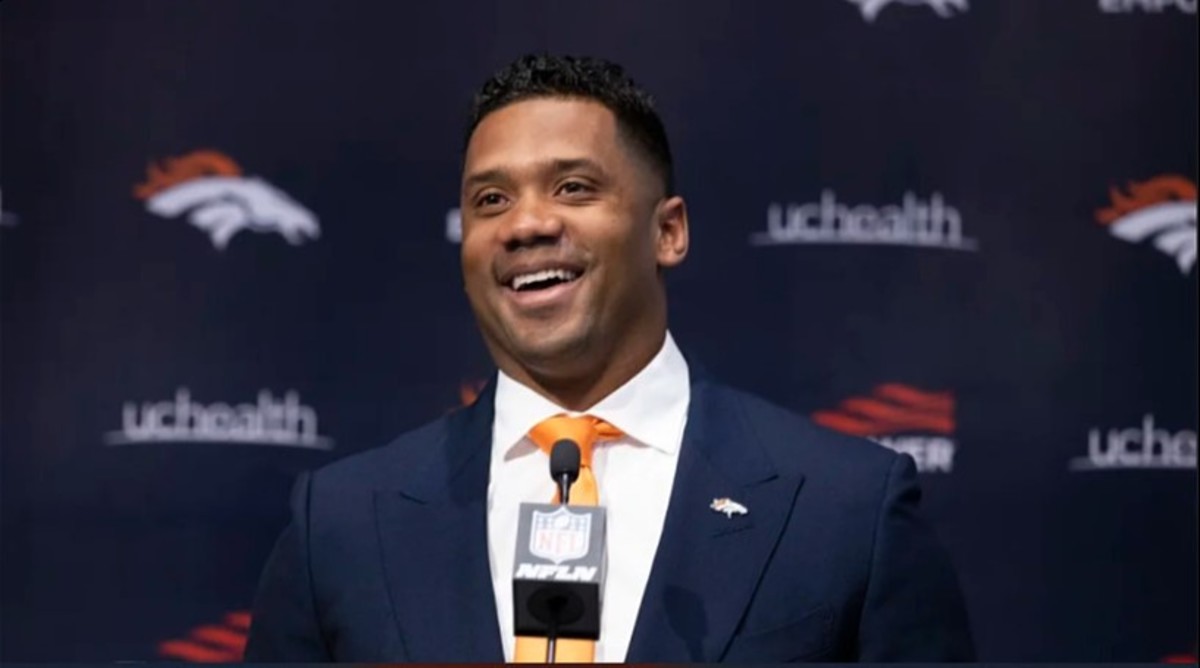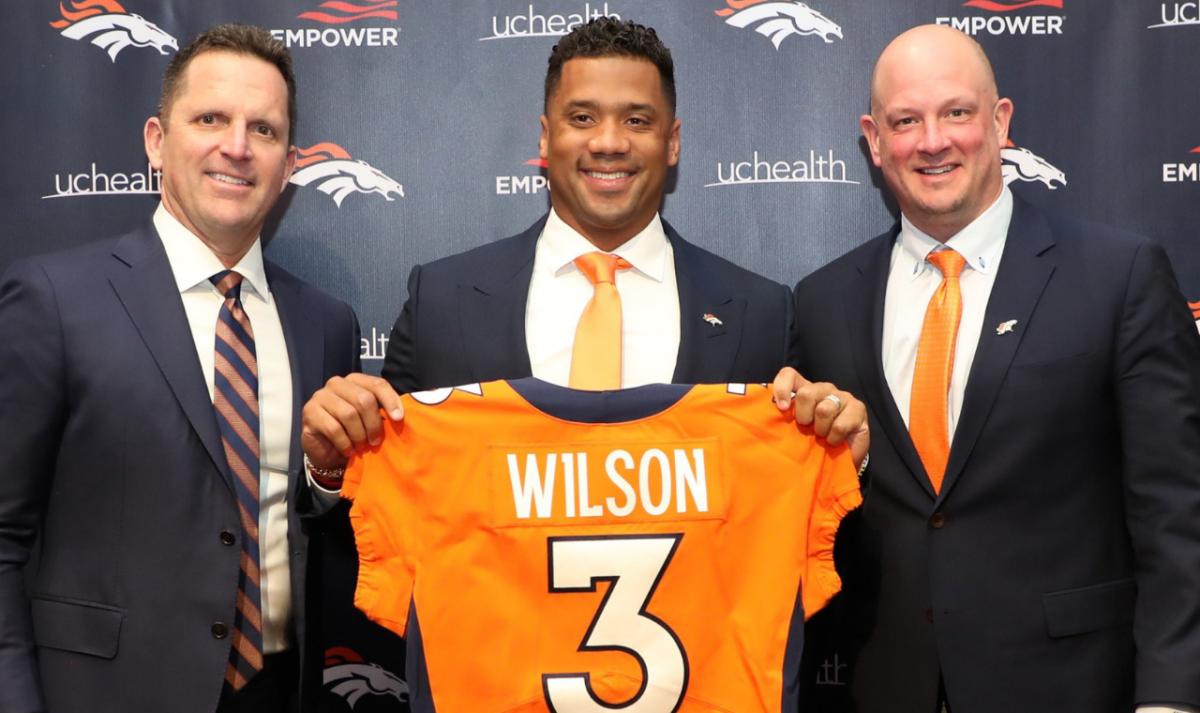Here's Why Broncos Won't Have to Re-Set QB Market on a Russell Wilson Extension
There's no end to the massive contracts being given to players throughout the NFL — and quarterback is no exception.
It's no surprise that some would believe that, with Russell Wilson entering the final two years of his current contract, the Denver Broncos need to hurry up and extend him before prices skyrocket. Some of this reaction comes on the heels of Las Vegas Raiders quarterback Derek Carr agreeing to a three-year deal worth a reported $121 million.
That's on top of recent contracts for Aaron Rodgers in Green Bay (who re-set the market in almost every aspect when he agreed to his deal) and Deshaun Watson in Cleveland (who got five years fully guaranteed).
However, it's not as simple as it may first appear. Let's examine the quarterbacks I've already mentioned, then we'll look at another QB who signed a recent extension and see what it may mean for Wilson's situation.
What Lies Beneath the Big Contracts

Let's start with Carr. Within minutes of his new contract announcement, Mike Florio at Pro Football Talk revealed that the contract wasn't as great for Carr as it may have appeared.
Florio reported that Carr got only $24.9M fully guaranteed upon signing. While the full contract details haven't been released, if Florio's report holds up, Carr's contract isn't as good as the $40.5M average per year salary suggests.
It's hard to see Wilson agreeing to any extension where he gets just $24.9M fully guaranteed. That's less money than the franchise tag for quarterbacks for 2021.
The Carr contract isn't a good comparison. What about the Rodgers contract?
On one hand, Rodgers is one of the best QBs in the NFL and arguably one who should re-set the market. On the other hand, look at how the Packers handled his situation.
In 2020, Green Bay traded up to draft Jordan Love in Round 1, despite Rodgers playing well. Rodgers then produced an MVP season and, during the 2021 offseason, reports of his displeasure with the Packers surfaced.
Ultimately, he and the Packers agreed to a renegotiated deal that gave him a large sum of money in 2022 and voided the remaining years. The new deal put the Packers into a position in which they would either have to extend him or part ways in 2022.
After Love started one game in 2021 and played poorly, the Packers appeared to have second thoughts about him, particularly after Rodgers won another MVP award. Rodgers then got the Packers to give him that contract that gave him $101M fully guaranteed upon signing.
The Rodgers situation was one in which the Packers made a move that signaled they were going to replace him, only things didn't work out that way. In essence, the Packers put themselves into a situation in which Rodgers eventually capitalized.
As for Watson, who made it known after the 2020 season that he wanted out, the Houston Texans refused to take any calls about trade offers. Then came the multiple sexual harassment/assault lawsuits and plenty of teams who had interest changed their minds.
Watson was inactive and radioactive the entire 2021 season and a reported attempt to trade him to the Miami Dolphins fell through. Enter 2022, where the Texans decided to trade him and the whole affair gets played out in public.
We watched as four teams showed interest in Watson, and the quarterback listened to their offers, then public announcements came each time he eliminated a team. The first team eliminated, the Browns, then came back into the picture and offered that five-year contract that fully guaranteed the entire $230M sum.
In short, the Watson situation was a quarterback whose trade situation had far more details made known public than any other. And, in the end, the first team eliminated came back with an offer that Watson wasn't about to turn down.
So we have one QB who didn't get as favorable a deal as he might have, another QB whose team bungled its situation and was forced to pay him a lot to make him happy, and a third QB where plenty of details were made public and one team made a clear move out of desperation.
These aren't really the situations to compare to Wilson. But there is one that might be more comparable — and it happens to be another QB who signed a recent extension.
Matthew Stafford's Situation

Let's go back to 2021 when the Lions decided to trade Stafford. If you'll recall, while word came out that the Lions planned to trade him, it wasn't the public spectacle like with Watson.
There were reports of multiple teams being interested in Stafford, with the Broncos among them. However, we didn't have an ongoing affair where somebody announced who Stafford eliminated from contention. Instead, it was the more common situation in which you hear that certain teams are interested, ending with the team that eventually acquired him.
The Los Angeles Rams, of course, are that team. Now, consider the Rams' situation — after giving up a third-round pick and two future firsts, you would think the Rams would be quick to extend him, especially with QB prices going up.
And that's especially true when you consider that the Rams are owned by Stan Kroenke, who is willing to spend money. Head coach Sean McVay got the Rams to multiple playoff trips and a Super Bowl with Jared Goff at quarterback. Plus, the Rams had a quality receiving duo, a good offensive line, a top pass rusher in Aaron Donald, and a top cornerback in Jalen Ramsey.
Despite all of this, the Rams didn't extend Stafford upon acquiring him. The team still didn't budge when Josh Allen signed his new contract and became, at the time, the first QB to get $100M in fully guaranteed money in a contract.
The Rams would win the Super Bowl, but no contract extension came immediately following. Stafford signed his extension a couple of weeks after the Rodgers deal was announced.
Stafford certainly got paid well, getting $160M in a four-year extension with $63M fully guaranteed and $120M in total guarantees. His contract ties him to the Rams through 2024, in which the Rams can't get out of the trade through either cutting or trading him without massive dead money charges, while losing rather than gaining cap space.
However, the Stafford deal didn't surpass Rodgers in terms of total guarantees. Stafford didn't come cheap, but he didn't re-set the market either.
In summary, the Rams showed that you don't have to be quick to extend a quarterback you just acquired for multiple firsts, even when you have a great situation in place.
So what may have led to Stafford taking less money than he might otherwise? My belief is simple: The Rams didn't do anything to upset Stafford, nor make a public spectacle about contract negotiations.
Wilson's Situation

This brings us back to Wilson. Like the Rams, the Broncos gave up multiple firsts to acquire the quarterback — and, in fact, gave up more in draft capital than the Rams. Yet, like the Rams, the Broncos haven't been quick to extend him.
It's true the Broncos ownership situation hasn't been settled, but even so, an owner willing to spend money doesn't guarantee Wilson gets extended. There are other unknowns that remain even when the Broncos get their new owner.
Nathaniel Hackett enters his first year as head coach and, thus, doesn't have McVay's pedigree or track record. While there is reason for optimism, it remains to be seen how good Hackett will be.
The Broncos do have quality wide receivers and a young cornerback in Patrick Surtain II, who has potential to reach the level Ramsey has reached. However, the Broncos don't have pass rushers who are as good as Donald — and one, Bradley Chubb, is a 'make or break' season — and there are questions about what the offensive line could look like in the long term.
Additionally, Wilson is coming off what some would call a disappointing season. He did play well prior to his finger injury, but wasn't as good when he returned. On the other hand, he played better in his final two games, so it's worth asking if he returned from injury too soon.
While there's plenty of reason to be excited about Wilson's arrival, we don't know yet how good he may be. While one shouldn't harp too much on Wilson's subpar play after returning from injury, it is something to consider.
In summary, it's not just the ownership situation in question. How good will Wilson be in 2022? How good will Hackett be?
Will Chubb prove worthy of an extension? Will Surtain show he is truly elite? How good will the offensive line be, and who will prove worthy of staying in 2023?
While the answers to some of these questions might mean that the Broncos don't extend Wilson this year, there are factors that may indicate a new deal won't be difficult to reach, nor will it re-set the market, if the team waits until 2023.
Reasons for Optimism on a Wilson Extension

While Wilson did have a no-trade clause in his contract, and there were multiple reports about teams for which he would be willing to play (including the Broncos), his trade situation was nothing like Watson.
Whereas with Watson, we got as close to a step-by-step public negotiation as we can get, the trade talks involving Wilson were mostly quiet.
Reports about Wilson being interested in certain teams is one thing and writers speculating about his future can't be prevented. However, the Broncos, Seahawks and Wilson and his representative said little publicly about what was going on behind the scenes.
When you don't make a public spectacle about something, the process usually goes smoother because parties have a better relationship. And while Wilson will get paid well if he plays at a high level, he may be more likely to act like Stafford than Rodgers or Watson when it comes times for a new deal.
Furthermore, by waiting on a new contract, the Broncos will be better able to manage the cap in future seasons. While the Broncos are projected to have $16.1M in cap space for 2023, that's without carryover and we don't know yet what it will be. Furthermore, that's with 41 players under contract and, right now, the Broncos are estimated to have $8.6M once they have get to 51 players under contract.
A Wilson extension in 2023 would lower his cap number and thus give the Broncos flexibility to improve the team in free agency. A Wilson extension now means he would have a higher cap number in 2023 and, thus, less flexibility.
Bottom Line
My belief is that, as long as Wilson believes the Broncos are the best situation for him, particularly if he likes Hackett, he'll be more willing to take a deal similar to Stafford — one that pays him well from 2023 to 2025 but doesn't re-set the market.
The best thing for the Broncos is to keep the current market in mind but not dwell on it. Also, the Broncos need to avoid making a public ordeal about Wilson's contract situation.
While you can't stop analysts and fans from discussing it, that doesn't mean the Broncos should turn it into a public negotiation. Let the analysts and fans have their opinions — the Broncos need to keep things mostly quiet on their end, just as they did with the trade talks.
Wilson certainly won't come cheap if he has a great 2022 season. But if the Broncos handle the situation well, they may not have to show Wilson as much money as some people think.
Follow Bob on Twitter @BobMorrisSports.
Follow Mile High Huddle on Twitter and Facebook.
Subscribe to Mile High Huddle on YouTube for daily Broncos live-stream podcasts!
